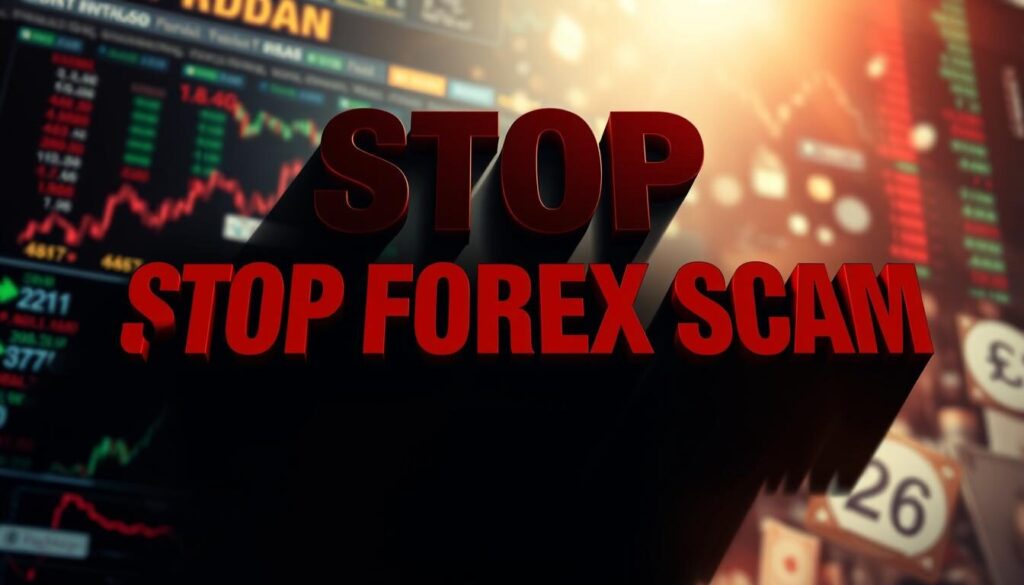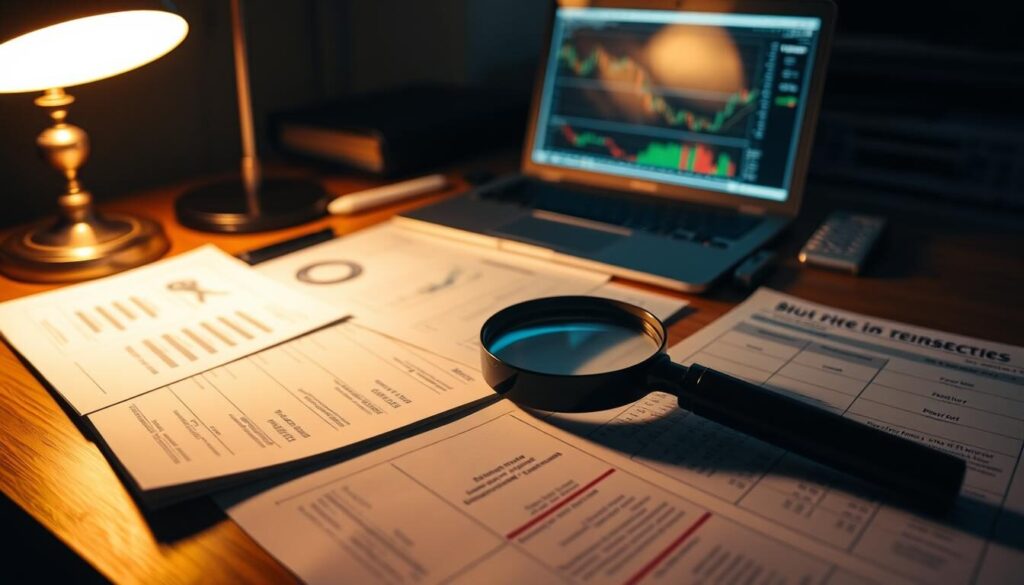Picture this: 1 in 3 forex traders report encountering suspicious broker activity. That’s like buying concert tickets only to find out the venue doesn’t exist. If your gut’s telling you something’s off with your broker, you’re not alone. We’ve all had that “wait, did I just get played?” moment – it stings like stepping on a LEGO brick barefoot.
First things first: take a breath. Untangling this mess is like fixing knotted headphones – frustrating but doable. Acknowledging the situation is your power move here. Many traders freeze up, thinking “Maybe it’s just me?” Spoiler alert: It’s not. Fraudulent brokers often use urgency tactics straight from infomercials (“Act now or miss out!”) to cloud judgment.
This guide’s your roadmap through the chaos. We’ll help you spot red flags faster than a TikTok trend, from too-good-to-be-true promises to shady verification requests. Ever heard a broker claim there’s “no bear market” in forex? That’s financial fantasy talk – real markets have ups and downs.
Here’s the game plan: We’ll break down recovery steps like you’re explaining crypto to your grandma. Verification checks? Think of it as online dating background research. Legal options? More satisfying than canceling a spam subscription. Let’s turn that “oh no” moment into actionable next steps.
Key Takeaways
- Acknowledging potential fraud is the crucial first step toward resolution
- Verify broker credentials through official channels like the CFTC
- Watch for red flags like guaranteed profits or urgent cash requests
- Document all transactions and communications systematically
- Professional guidance can simplify complex recovery processes
Understanding Forex Scams
Imagine a 24-hour global marketplace where $6 trillion changes hands daily – that’s forex trading in a nutshell. Currencies shuffle between traders like hot potatoes at a county fair, with values shifting faster than TikTok dance trends. But here’s the catch: this decentralized system lacks a referee, making it the financial Wild West for opportunists.
Currency Carnival or Con Job?
Scammers love forex’s complexity like moths love neon lights. Their playbook? Flashy promises of “risk-free riches” paired with Wolf of Wallstreet-level sales pitches. Ever gotten a midnight text screaming “Double your money by dawn!”? That’s their bread and butter – pressure tactics sharper than a sushi chef’s knife.
Smoke and Mirrors 101
Fraudsters weaponize financial jargon like “high-yield arbitrage opportunities” to sound legit. It’s like someone explaining quantum physics using only emojis – confusing but strangely convincing. Watch for these red flags:
- “Guaranteed 100% monthly returns” (Spoiler: Even Warren Buffett averages 20%)
- Unregulated brokers offering 500:1 leverage (Basically trading with Monopoly money)
- Fake celebrity endorsements (No, Elon Musk isn’t running a secret forex Telegram group)
These cons often use OTC trading’s opacity like a magician’s curtain – hiding shady spreads and phantom trades. Remember: real trading has losses too. Any system claiming otherwise is about as authentic as a three-dollar bill.
Recognizing the Signs of a Forex Scam
Think of forex trading as ordering a mystery burger – you need to check what’s inside before taking a bite. Scammers thrive on confusion, dressing up cons with flashy charts and financial jargon. Here’s how to spot the difference between sizzle and substance.
Unrealistic Profit Claims
Ever seen a broker promise “50% monthly returns guaranteed”? That’s like claiming you’ll lose weight eating cake daily. Legitimate traders know markets swing – even Warren Buffett averages 20% annually. Scammers use these fantasy numbers like carnival barkers, hooking victims with FOMO while hiding risks.
Real talk: High leverage offers (like 500:1) are financial quicksand. They magnify losses faster than a TikTok dance goes viral. Check your account statements. If profits look too perfect – no drawdowns, ever – you’re likely seeing digital smoke and mirrors.
Opaque Communication and Hidden Fees
Transparent brokers explain fees like a nutrition label – upfront and clear. Scammers? They’re more like magicians pulling fees from hats. Watch for:
- Withdrawal delays (“Just one more trade!”)
- Mystery charges labeled “administrative costs”
- Spread markups wider than a Texas highway
One trader discovered $2,000 in hidden fees after three months – like finding mold in your takeout container. Always cross-check reviews on independent sites. Patterns of complaints about “account lockouts” or sudden fee changes scream trouble.
Remember: Legit firms register with the CFTC/NFA. It’s like checking a restaurant’s health grade before dining. Takes two minutes, saves years of heartburn.
Immediate Actions to Take When You Suspect a Scam

Time to hit pause – your gut’s flashing warning lights like a car dashboard. Scammers thrive on momentum, turning hesitation into financial quicksand. Think of this moment as spotting a leak in your boat: swift action keeps you from sinking deeper.
Freeze the Money Flow
Stop payments faster than slamming brakes at a red light. Every dollar sent feeds the scam machine. Here’s your emergency protocol:
- Cancel recurring transfers (even “small” ones)
- Block broker access to your accounts
- Alert your bank with specific fraud codes
One trader recovered 60% of funds simply by freezing transactions within 48 hours. Scammers often push for “just one more deposit” – resist like saying no to midnight pizza cravings.
Build Your Paper Trail
Documentation is your financial bodycam. Screenshot every interaction like collecting evidence at a crime scene. Organize:
- Trade confirmations (dates/amounts)
- Chat logs with pressure tactics highlighted
- Bank statements showing withdrawals
Store copies in multiple places – cloud, USB, printed. Remember that broker who denied a $15k withdrawal? His victim won the case using timestamped WhatsApp messages as proof.
Acting now doesn’t guarantee getting money back, but it’s like applying a tourniquet – stops the bleeding while you seek help. Next steps? We’ll help you navigate the recovery maze.
What to Do If You’ve Been Scammed by a Forex Broker

Ever tried unlocking a phone with the wrong passcode? That’s how it feels when a broker blocks your account. Now’s the time to switch from panic mode to strategic action – think Jason Bourne with a spreadsheet.
Contacting Regulatory Authorities
Regulators are your financial neighborhood watch. Start by filing complaints through official channels like the FCA’s scam reporting tool or SEC’s whistleblower portal. One trader recovered 40% of funds after ASIC froze the broker’s assets – like catching a pickpocket mid-theft.
Check registration status using the FCA’s Financial Services Register. Clone firms often use lookalike websites – spot fakes like verifying concert tickets. Pro tip: Save complaint reference numbers like rare Pokémon cards.
Seeking Expert Financial Guidance
Legal teams like Giambrone & Partners act as GPS for navigating cross-border messes. They’ve helped recover $200M+ in assets – think Ocean’s Eleven meets courtroom drama. Recovery services aren’t magic wands, but they’re better than shouting into the void.
Always verify advisors through FINRA’s BrokerCheck. One investor avoided a $50k “recovery fee” scam this way – like spotting a fake Uber driver. Remember: Regulated professionals won’t promise miracles, just realistic paths forward.
While full recovery isn’t guaranteed, each documented step tightens the net. It’s like finding Waldo – tedious but possible with the right tools and persistence.
Collecting and Documenting Evidence

Evidence is your financial flashlight in a dark room – it reveals what’s hidden. Building a case against shady companies starts with treating every document like gold dust. Think of it as assembling IKEA furniture without the manual: messy but necessary.
Transaction Receipts Tell the Real Story
Start with bank statements and trade confirmations. These records are your financial breadcrumbs – they show where your funds traveled. One trader traced $28k to shell companies using withdrawal receipts alone. Save emails and chat logs like you’re preserving rare memes.
Digital Paper Trail Organization
Create folders labeled by date and transaction type. Screenshot platform activity like you’re capturing TikTok drama – timestamps matter. Cloud storage acts as your evidence vault. Pro tip: Use spreadsheet tabs to map fund movements through financial markets.
Detailed documentation works like a puzzle – each piece reveals part of the picture. Regulators need clear data trails to freeze suspicious accounts. Your organized files could become the smoking gun in recovery efforts. Remember: The paper trail acts like GPS for tracing investment flows through murky channels.
Engaging Legal and Financial Recovery Resources

Navigating international scams is like following GPS directions through a dead zone – frustrating but not hopeless. When money vanishes across borders, you need specialists who speak the language of global finance and local laws.
Financial Detectives for Digital Heists
Think of recovery experts as Jason Bourne with law degrees. They track funds through offshore accounts like following breadcrumbs in a cyber forest. One firm recently traced $1.2 million to a Caribbean shell company – turns out the “broker” was operating from a coffee shop in Manila.
Legal fees work two ways: hourly rates ($$$) or success-based cuts (20-30%). For sums over $10k, it’s like hiring a plumber for a burst pipe – painful upfront, but cheaper than drowning. Check credentials through Martindale-Hubbell ratings before signing anything.
The Jurisdiction Jungle Gym
Cross-border cases face more red tape than a kindergarten art project. Your broker’s “office” in Cyprus? Might actually be a mailbox in Belarus. Regulators like the CFTC can freeze assets, but only if they’re in cooperating countries.
Social media becomes your megaphone here. Posting detailed scam reports on Twitter/X with #ForexAlert can trigger chain reactions. One victim’s TikTok exposé led to three others coming forward – their combined evidence became a prosecutor’s goldmine.
Document every broker interaction like you’re writing a true crime podcast script. Screenshots, voice memos, even emoji responses matter. While full money recovery isn’t guaranteed, seasoned pros turn needle-in-haystack searches into strategic missions. It’s not magic – just better compasses.
Tips for Protecting Yourself in Future Forex Trading

Choosing a forex broker is like swiping right on dating apps – exciting but risky. Before committing, you’ll want to do more background checks than a nosy neighbor. Let’s turn you into a Sherlock Holmes of financial partnerships.
Broker Background Checks 101
Start with regulatory credentials – it’s like checking a restaurant’s health inspection grade. Legit brokers register with the CFTC or FCA faster than influencers chase blue checkmarks. Pro tip: Cross-reference license numbers on official sites. One trader found three “regulated” brokers using expired credentials – financial catfishing at its finest.
Dig deeper than surface-level reviews. Scour forums like Reddit’s r/Forex with the intensity of decoding a crush’s Instagram likes. Watch for patterns:
- Multiple complaints about withdrawal delays
- “Account managers” pushing risky trades
- Bonuses requiring 50x trading volume
Stick to trusted mobile trading platforms with physical addresses – if their HQ looks like a PO box in the Bahamas, swipe left.
Your Financial Seatbelt Strategy
Risk management isn’t about avoiding losses – it’s surviving market rollercoasters. Treat stop-loss orders like airbags: set them before you crash. Allocate only 1-2% of your account per trade. Remember that guy who YOLO’d his savings on EUR/USD? He’s now the cautionary tale of r/WallStreetBets.
Diversify like you’re assembling a Spotify playlist – mix currencies, time zones, and strategies. And always ask: “Would I bet my Netflix password on this trade?” If not, reconsider your position size. Markets reward patience more than impulsiveness – turtle beats hare every time.
Utilizing Regulation and Reporting Mechanisms
Reporting a forex scam is like pulling a fire alarm – it alerts everyone and starts the containment process. Regulatory bodies act as financial firefighters, but they need your smoke signal first. Here’s how to turn frustration into action that protects both your wallet and others in the market.
Filing Complaints with Regulatory Bodies
Start with the CFTC’s online complaint form – it’s simpler than ordering DoorDash. Include screenshots, transaction IDs, and broker communications. One trader’s detailed report to the SEC triggered an asset freeze on three offshore accounts. Your experience becomes evidence that builds cases brick by brick.
Each country has its financial watchdogs. In the U.S., the FTC handles consumer fraud while the IC3 tracks cybercrimes. European traders? ESMA’s your authority. Asian markets? Check with the Monetary Authority of Singapore. It’s like knowing which hospital department treats burns versus broken bones.
Using Trusted Financial Institutions and Reviews
Stick to brokers vetted by the global financial system’s gatekeepers. Look for firms that undergo third-party audits – their compliance reports should be as public as a TikTok dance challenge. Verified reviews on platforms like Trustpilot reveal patterns faster than binge-watching scam documentaries.
Cross-border issues? Think of regulators as pen pals with legal teeth. While recovery might take longer than a DMV visit, your report strengthens international crackdowns. Recent data shows 37% of successful fraud cases began with individual complaints. Your voice matters – even if it starts as a whisper in the market storm.
Leveraging Community and Expert Advice
Trading’s secret weapon? Your fellow traders. Think of financial forums as digital campfires where survivors swap scam stories and recovery hacks. These spaces crackle with unfiltered truths – the kind you won’t find in glossy broker brochures.
Learning from Other Traders’ Experiences
Reddit’s r/Forex threads read like thriller novels sometimes. One user detailed how a “broker” faked server crashes during withdrawals – until three victims compared timestamps. Patterns emerge faster in groups than solo research. Pro tip: Search forums for your broker’s name plus “withdrawal” or “bonus terms”.
Authentic reviews act like financial weather reports. Platforms like Trustpilot reveal storm clouds others spotted first. Did multiple users mention sudden fee changes? That’s the trading equivalent of a restaurant suddenly charging for tap water.
Engaging in Online Forums and Support Networks
Telegram groups and Discord servers buzz with real-time alerts. Join communities moderated by verified experts – they’re the bouncers keeping scam artists off the guest list. Share your story anonymously if needed. As one trader posted: “Admitting I got duped was embarrassing… until five others said ‘Me too’.”
| Solo Research | Community Insights | Expert Analysis |
|---|---|---|
| Limited perspective | Pattern recognition | Regulatory context |
| Google deep dives | Real-time scam alerts | Legal precedents |
| Broker FAQs | Screenshots as evidence | Asset recovery stats |
These networks do double duty – they help you get money recovery strategies while easing the “Why didn’t I see this?” guilt. Bookmark threads where experts dissect common forex scam tactics. Remember: Your experience could be someone else’s lifeline tomorrow.
Leave detailed reviews wherever brokers lurk – it’s like spray-painting “Wet Paint” on a park bench. Together, we make the markets safer one truth bomb at a time.
Conclusion
Rebuilding trust in forex trading starts with small, smart steps – like learning to ride a bike after a spill. You’ve now got the tools to verify brokers, freeze suspicious activity, and document evidence like a financial detective. Acting fast matters more than perfection – think of it as hitting “mute” on a scammer’s sales pitch.
Remember: Every case filed with regulators tightens the screws on shady operators. While recovery isn’t instant coffee, communities and legal pros can help brew solutions. Join forums where traders swap war stories and prevention tactics – it’s like having 24/7 backup singers for your financial journey.
Stay sharp in the markets by treating broker checks like checking expiration dates on milk. Today’s frustration could become tomorrow’s firewall against scams. Ready to turn setbacks into comebacks? We’re here when you need fresh strategies or just a virtual high-five.
